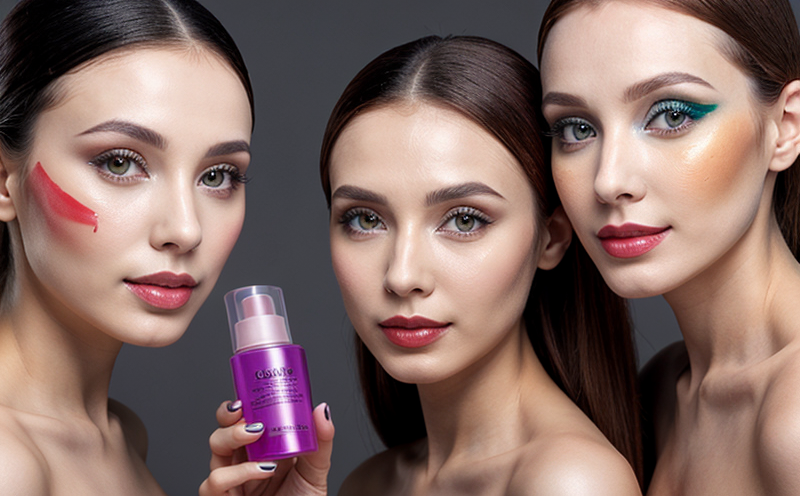Human Sensitization Studies for Cosmetic Products
The human sensitization study is a critical component in ensuring the safety and efficacy of cosmetic products. This test evaluates whether a cosmetic ingredient or product can cause an allergic reaction, which could lead to dermatitis or other adverse effects on consumers. The primary goal is to identify potential allergens that may trigger immune responses, thereby protecting users from harmful reactions.
In the cosmetics industry, understanding and managing sensitization risks are paramount. Regulatory bodies worldwide mandate rigorous safety assessments to safeguard public health. For instance, in Europe, regulations like the Cosmetics Regulation (EC) No 1223/2009 require comprehensive testing for allergens. In the United States, the Food and Drug Administration (FDA) also emphasizes the importance of such studies.
The human sensitization test typically involves exposing subjects to the cosmetic product or its individual ingredients under controlled conditions. Observations are made over a defined period to detect any signs of allergic reactions. This process is essential for manufacturers aiming to comply with international standards and ensure their products meet stringent safety requirements.
One of the key challenges in conducting these studies lies in accurately identifying low-level sensitizers that could go unnoticed through conventional methods. Advances in biotechnology and analytical chemistry have improved our ability to detect such substances, making it possible to screen for both known and novel allergens. This capability is crucial for maintaining a competitive edge in an increasingly regulated market.
The significance of human sensitization studies extends beyond compliance; they play a vital role in protecting brand reputation by demonstrating a commitment to consumer safety. A well-executed study can significantly reduce the risk of recalls, lawsuits, and negative publicity. Moreover, these tests help companies develop safer formulations that cater to diverse consumer needs.
In summary, human sensitization studies are indispensable for ensuring the safety of cosmetic products. By employing rigorous testing protocols and leveraging advanced analytical techniques, laboratories like ours provide reliable data that support informed decision-making in product development and regulatory compliance.
Scope and Methodology
| Aspect | Description |
|---|---|
| Test Subjects | The test subjects are typically adult volunteers who undergo a thorough medical examination before participation. These individuals must not have any known allergies to the ingredients being tested. |
| Testing Procedure | The procedure involves applying the cosmetic product or its components onto the skin of the test subject and observing for signs of allergic reactions over a specified period, usually up to 48 hours. |
| Materials Used | Standardized reagents and solutions are used to ensure consistency in testing. These include preservatives, antioxidants, and other common cosmetic ingredients. |
| Data Collection | Data is collected on the appearance of any rash, redness, or swelling. Additional physiological data may also be recorded for more comprehensive analysis. |
| Reporting | The results are compiled into a detailed report that includes the test conditions, observed reactions, and recommendations for product modification if necessary. |
This table outlines the key aspects of human sensitization studies, providing a clear overview of the process from subject selection to final reporting. By adhering to these standardized procedures, we ensure accurate and reliable results that meet international standards.
Benefits
The benefits of conducting human sensitization studies are manifold, offering significant advantages for both manufacturers and consumers:
- Regulatory Compliance: Ensures that products comply with local and international safety regulations. This is particularly important in markets like the EU and USA where stringent standards are enforced.
- Risk Mitigation: Identifies potential allergens early in the product development cycle, reducing the risk of adverse reactions and associated legal issues.
- Enhanced Reputation: Demonstrates a commitment to consumer safety, which can enhance brand reputation and customer trust.
- Informed Product Development: Provides valuable insights into ingredient behavior, allowing for safer and more effective product formulations.
- Consumer Protection: Ensures that products are free from harmful allergens, thereby protecting the health and well-being of consumers.
The cumulative effect of these benefits is a safer environment for both manufacturers and end-users. By prioritizing human sensitization studies, companies can build a strong foundation for long-term success in the cosmetics industry.
Why Choose This Test
Selecting the right testing method is crucial when it comes to ensuring product safety. Here are several compelling reasons why you should choose our human sensitization studies:
- Accurate Results: Our team of experts ensures that every test is conducted with precision, leading to reliable and accurate results.
- Comprehensive Coverage: We cover a wide range of cosmetic ingredients and formulations, ensuring broad applicability across various product lines.
- State-of-the-Art Facilities: Equipped with the latest technology and instrumentation, our labs provide the highest standards in testing.
- Compliance Expertise: Our team is well-versed in international regulations, ensuring that your products meet all necessary requirements.
- Expert Guidance: Our consultants offer valuable insights into product development and formulation, helping you make informed decisions.
- Swift Turnaround Time: We understand the importance of timely delivery and strive to provide quick turnaround times without compromising quality.
By partnering with us for your human sensitization studies, you can rest assured that your products are thoroughly tested and ready for market. Our commitment to excellence sets us apart in the industry, ensuring that your brand is trusted and respected.





